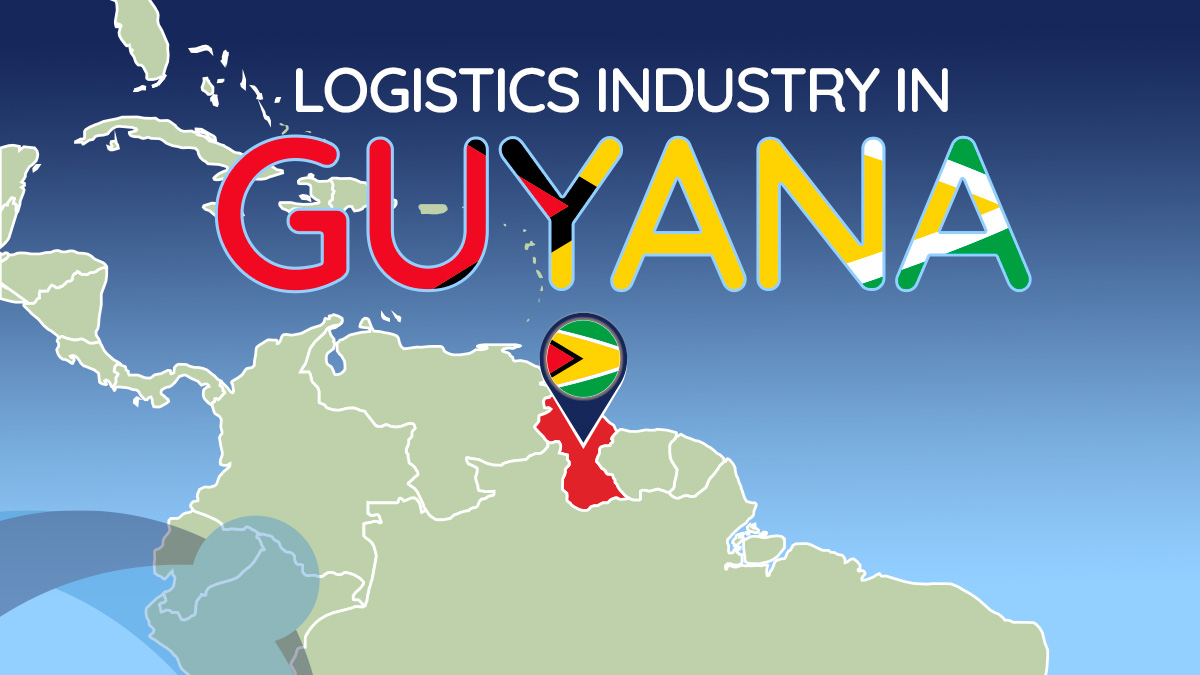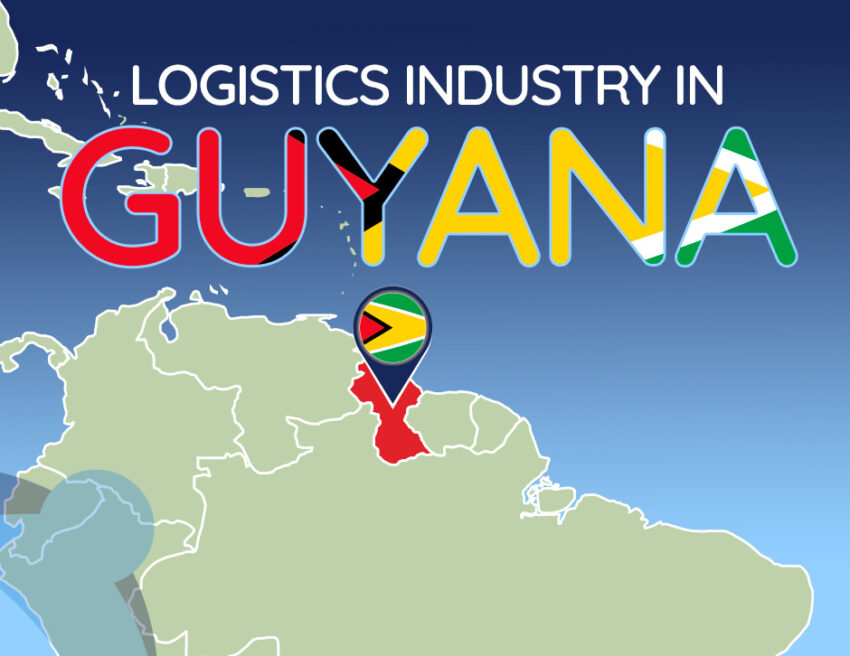The logistics industry in Guyana is rapidly evolving, spurred by the country’s economic growth and its emergence as a significant player in global trade. With vast natural resources, notably oil and gas, Guyana has attracted international attention, creating a growing demand for robust logistics services to support trade, transport, and infrastructure. However, the country’s logistics sector faces its own set of challenges that need to be addressed for it to fully leverage the opportunities.
In this blog, we will explore the key challenges and opportunities facing the logistics industry in Guyana, providing a comprehensive view of its potential for growth and development.

Challenges in Logistics Industry in Guyana
1. Infrastructure Limitations
One of the most significant challenges for the logistics industry in Guyana is its underdeveloped infrastructure. The country’s road network is limited, with many roads, particularly in rural areas, being unpaved or in poor condition. This makes transportation of goods difficult, especially during the rainy season when many roads become impassable.
- Road infrastructure: Poor road conditions can result in delays, higher transportation costs, and even damage to goods. This is a critical issue for businesses involved in the import and export of perishable goods, which rely on timely delivery to maintain product quality.
- Limited port facilities: While Georgetown’s port is a key entry point for imports and exports, the country lacks the port capacity and advanced technology to handle large volumes of cargo efficiently. This leads to congestion and delays in the movement of goods, affecting both international trade and domestic supply chains.
- Inadequate air transport: Air transport infrastructure in Guyana is also lacking, with limited routes and flight frequency. For businesses that rely on air freight, this presents challenges in terms of both availability and cost.
2. Regulatory Barriers
The logistics industry in Guyana faces various regulatory challenges that can hinder its efficiency and growth. The country’s customs procedures are often perceived as complex, time-consuming, and lacking transparency, which can delay the import and export of goods.
- Customs procedures: Lengthy customs clearance processes increase costs for businesses and create inefficiencies in supply chains. Additionally, inconsistent enforcement of regulations can cause uncertainty for logistics companies.
- Trade barriers: Bureaucratic red tape and trade restrictions can pose further challenges to companies involved in international trade, limiting the scope of growth for logistics businesses.
4. Geographic and Environmental Challenges
Guyana’s geography presents a number of challenges for the logistics industry. The country’s terrain includes vast forests, rivers, and remote areas that are difficult to access, which can make transportation of goods costly and time-consuming.
- Remote regions: Serving remote regions, such as mining and oil exploration areas, can be particularly challenging due to the lack of roads and infrastructure. Logistics companies often have to rely on river transport or helicopters, both of which add significant costs to operations.
- Environmental impacts: As an ecologically diverse country, Guyana faces pressure to balance economic growth with environmental sustainability. The logistics sector must navigate environmental regulations aimed at reducing its carbon footprint while supporting the country’s development.
Opportunities in Guyana’s Logistics Sector
1. Oil and Gas Industry Growth
The discovery of vast offshore oil reserves in Guyana has placed the country on the map as one of the fastest-growing economies in the world. This burgeoning oil and gas industry presents enormous opportunities for the logistics sector.
- Supporting the energy sector: The need for logistics services to transport equipment, materials, and personnel for oil exploration and production is rapidly increasing. Logistics companies that can efficiently serve the oil and gas industry stand to gain substantial business opportunities.
- Infrastructure development: The growth of the oil and gas sector is also driving investments in infrastructure, including ports, roads, and airports. These developments will not only benefit the energy industry but also improve logistics capabilities for other sectors, making it easier and more cost-effective to move goods across the country.
2. Trade Facilitation and International Partnerships
As Guyana continues to expand its trade relationships, there are numerous opportunities for the logistics industry to capitalize on growing international trade flows. The country is strategically located in the northern part of South America, offering easy access to major regional markets.
- Regional trade agreements: Guyana is a member of the Caribbean Community (CARICOM), which provides access to a regional market of over 15 million people. Logistics companies can benefit from increased trade within the region by offering efficient transportation and supply chain solutions.
- Foreign investments: International companies are showing growing interest in Guyana’s market, particularly in sectors such as mining, agriculture, and energy. These investments bring new opportunities for logistics companies to serve both domestic and international clients.
3. E-commerce Expansion
E-commerce is an emerging sector in Guyana, and with the global shift toward online shopping, there are growing opportunities for logistics companies to offer last-mile delivery services. As more consumers turn to online platforms to purchase goods, the demand for reliable and efficient delivery services will increase.
- Last-mile delivery: With e-commerce expected to grow, companies that can provide fast and reliable last-mile delivery services will be well-positioned to capture a significant share of the market.
- Warehouse and distribution solutions: E-commerce growth also opens opportunities for logistics providers to offer warehousing and distribution services, helping retailers manage their inventory and meet growing consumer demand.
4. Environmental Sustainability Initiatives
As the logistics industry in Guyana grows, there is increasing pressure to adopt environmentally sustainable practices. Companies that prioritize sustainability in their operations—by reducing carbon emissions, using energy-efficient vehicles, or adopting greener supply chain practices—can differentiate themselves in the market.
- Green logistics: Guyana’s logistics industry has an opportunity to lead in the adoption of green logistics practices. By investing in clean energy, sustainable transport, and environmentally friendly logistics solutions, companies can position themselves as responsible and forward-thinking players in the industry.
How Small and Mid-Sized Logistics Companies in Guyana Can Grow Their Operations
As Guyana continues to position itself as a key regional logistics hub, small and mid-sized logistics companies are actively seeking ways to expand and thrive in a competitive landscape. For these businesses, joining one of the top logistics networks, such as Conqueror Freight Network, can be a transformative strategy to ensure long-term growth and enhance their market competitiveness. Conqueror, the largest exclusive freight forwarders network on the globe, provides its members with unparalleled international reach, valuable resources, and member benefits that offer significant opportunities for Guayana-based logistics companies to scale their operations and improve their service capabilities.
Overcoming Limitations Through Conqueror’s Global Network
Independent freight forwarders often struggle with limited resources, connections, and market reach, which can make it hard to compete with larger logistics providers that have established global networks and greater operational capabilities. However, by joining Conqueror Freight Network, these smaller companies gain access to an extensive network of reliable logistics partners spanning multiple countries and continents.
Conqueror’s network consists of thoroughly vetted, independent freight forwarders in over 260 cities worldwide. By becoming part of this expansive network, Guyana-based logistics companies can immediately connect with trusted partners across the globe, allowing them to expand their service offerings without needing substantial investments in overseas offices or personnel. Through collaboration with other Conqueror members, logistics companies in Guyana can manage complex international shipments, provide end-to-end solutions, and ensure smooth cargo movement across borders.
Boosting Credibility and Gaining Market Access
For small and mid-sized logistics companies in Guyana, joining a prestigious network like Conqueror can greatly enhance their credibility. As Conqueror maintains a rigorous screening process to ensure that only the most reliable and financially stable companies join the network, membership becomes a mark of trustworthiness and high-quality service. This stamp of approval can be crucial in attracting new clients, particularly multinational corporations seeking logistics partners in the region.
Moreover, Conqueror’s collaborative framework fosters strategic partnerships, enabling companies to enter new markets, even in regions where they lack a physical presence. This provides logistics firms in Guyana with an excellent opportunity to expand beyond their local boundaries and increase their global footprint.
Leveraging Conqueror’s Resources and Support
One of the key advantages of joining Conqueror Freight Network is the wide range of resources and support it offers to its members. Conqueror provides members with a free online platform that facilitates the adaptation to industry-wide digitization trends. The network’s exclusive freight rate management tool, FreightViewer, helps streamline the quotation process, enabling quick and efficient responses to customer requests. This not only reduces the workload but also enhances customer satisfaction.
In addition, Conqueror organizes an Annual Meeting where all members come together to explore potential collaborations and business opportunities. These face-to-face meetings allow members to establish personal relationships with partners, fostering a cooperative environment that helps businesses increase their transaction volumes through mutual support and collaboration.
Financial Protection and Cost Savings
A major benefit of joining Conqueror is the financial protection offered by the network’s payment protection plan. This plan safeguards members from the risk of non-payment or financial instability from other members, allowing logistics companies in Guyana to engage in international transactions with greater confidence.
Additionally, Conqueror offers members exclusive cost-saving benefits. Guyana-based logistics firms can access discounted rates from partner service providers, such as insurance companies and technology platforms. These discounts help reduce operational expenses, contributing to improved profitability.
Conclusion
Guyana’s logistics industry faces significant challenges, from infrastructure gaps to regulatory hurdles. However, the country’s economic growth, driven by the oil and gas sector, presents vast opportunities for logistics companies to expand and innovate. By addressing these challenges and capitalizing on the opportunities, logistics providers in Guyana have the potential to play a critical role in the country’s continued economic development and global trade expansion.
As Guyana’s logistics sector continues to grow, small and mid-sized logistics companies must find ways to remain competitive in an increasingly global market. Joining Conqueror Freight Network, the largest exclusive freight forwarders network in the world, offers significant opportunities for businesses in Guyana to overcome limitations, expand their market reach, and increase their service offerings. With its global network, extensive resources, financial protections, and cost-saving benefits, Conqueror provides the essential tools for logistics companies to thrive in today’s competitive landscape.


